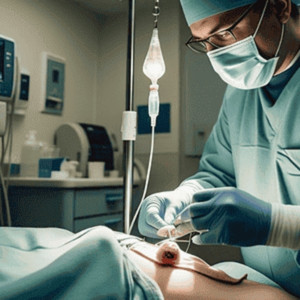
Lymph node dissection, also known as lymphadenectomy, is a crucial surgical procedure in cancer care. It involves the removal of one or more lymph nodes to determine whether cancer has spread beyond the primary tumor site. This procedure not only helps in accurate cancer staging but also plays a vital role in planning the most effective treatment.
Lymph nodes act as filters in the body’s immune system. When cancer begins to spread, it often travels first to nearby lymph nodes. By removing and examining these nodes under a microscope, doctors can assess how far the disease has progressed and whether additional treatments like chemotherapy, radiation, or immunotherapy are needed.

Lymph node dissection is commonly performed for cancers such as:
Depending on the cancer type and location, either a sentinel lymph node biopsy (removing the first few lymph nodes where cancer is likely to spread) or a complete lymph node dissection (removing a group of lymph nodes) may be recommended.
Benefits of Lymph Node Dissection:
Determines if cancer has spread
Helps guide post-surgical treatment decisions
May reduce the risk of recurrence
Supports accurate cancer staging
Surgical expertise and compassionate patient care to ensure the best possible outcome.
Surgical Stats That Speak for Themselves
Lymph node dissection is more than just a surgical step—it’s a powerful tool in understanding and fighting cancer with precision.
Before surgery, the doctor conducts imaging tests (like ultrasound, CT scan, or MRI) and reviews the cancer diagnosis to decide which lymph nodes need removal. Blood tests and anesthesia clearance are also done.
The surgeon carefully removes either the sentinel lymph nodes (first nodes where cancer may spread) or a group of lymph nodes in the region. Care is taken to avoid damaging surrounding nerves and blood vessels.
The patient is taken to the operating room and given general anesthesia to ensure they are completely asleep and pain-free throughout the procedure.

The removed lymph nodes are sent to a pathology lab, where a specialist examines them under a microscope to check for the presence and extent of cancer cell spread.
A precise incision is made near the area where the lymph nodes are located—commonly in the neck, underarm (axilla), groin, or pelvis—depending on the cancer type and location.
The surgical site is closed with stitches or staples, and a drain may be placed to remove excess fluid. The patient is then monitored during recovery, and post-operative care instructions are given to support healing.
Schedule your consultation today and explore safe, effective treatments tailored to your needs for a healthier future.
Another popular style with a title and description.
Read heartfelt experiences from our patients who trusted us with their cancer care and found hope, healing, and expert treatment.
EXCELLENTTrustindex verifies that the original source of the review is Google. We are profoundly indebted to you, Surgical Oncologist lieutenant Colonel Doctor Rahul ji for your exceptional erudition, meticulous care, and unwavering commitment during my sister-in-law’s (Ms.Promila Sharma) arduous journey with cancer. This l came to know only when l came to meet her. Your unparalleled expertise not only restored her health but also instilled within her an indomitable spirit and a renewed, optimistic outlook on life. The compassion and reassurance with which you guided her through each stage of treatment alleviated her anxieties and fortified her courage. Today, as she embraces life with vitality and hope, everyone recognizes that this transformation is a testament to your extraordinary dedication and benevolence. thank you for being more than just a doctor - for being a true a healer.Posted onTrustindex verifies that the original source of the review is Google. Dr Rahul Sandhu is truly the best oncologist in Mohali Chandigarh.His professional yet compassionate approach made a challenging journey much easier to face.dr Sandhu explain every procedure clearly and ensured that me and my wife were well informed and comfertable his expertise in cancer surgery and post operative care is unmached.the facility are Morden and hygienic I am grateful for the care I received and highly recommend dr Rahul Sandhu to anyone looking for the best cancer specialist in Mohali. If u are searching for a reliable and experienced onco surgeon in Mohali fdr rahul Sandhu is the name you can trust.Posted onTrustindex verifies that the original source of the review is Google. अपनी मैडम के साथ मुझे डॉक्टर राहुल संधू जी को मिलने का अवसर मिला उन्हें देखते ही सुकून मिलता है. . वह मुझसे क्या सभी से बहुत इज्जत से बात करते हैं उन्हें मिलने के बाद लगा डॉक्टर ऐसे ही होने चाहिए. मैंने मेरी मैडम में जो सच में चेंज देखी वह उनकी आशावादी सोच के कारण उनसे मिलने के बाद आई. Sat shri kal doctor ji aap apne aap mein ek star ho thank youPosted onTrustindex verifies that the original source of the review is Google. Thank you so much respected Doctor Sahib-came to know about your dedication towards your noble profession that has made tremendous and positive change in the life of my closest friend cum mentor Ms.Promila Sharma -your patient that you handled with much Patience and handled her sufferings and worries with your tender care Salute 🫡 to Doctor like you that replaces the fear of illness with trust in recovery God bless you always 🙏 Regards 🙏 Sangeeta & Surinder NagpalPosted onTrustindex verifies that the original source of the review is Google. Thanks message for gentle sophisticated surgical oncologist lieutenant colonel ... Dr Rahul Sandhu ,. Ji thank you for your caring nature your dedication to patients well being always putting them first . Thank you for taking the time to explain everything to your patient me during my treatment journey for being beacon of light in my times of confusion and sorrow I extend my gratitude to you your compassion have made a real difference in my life especially during recovery time ................ . Dr Rahul Sandhu ji Good doctors like you replace the fear of illness with trust in recovery it's gift from entity you are a true asset to the medical community credit goes to your parents and teacher .... . I hope everyone who is reading this is having a really good experience after meeting such a good human being . . . Dr Rahul Sandhu ji thanks a lot. . Some true feelings . ..... . From your patient 🙏P Sharma from TMCPosted onTrustindex verifies that the original source of the review is Google. Respected Dr Rahul sandhu . .. We will always remember your caring nature and for taking the time to explain complex medical concepts to one of our family member. .. .. In prolonged Treatment and under went many Therapies of My Dear sister Promil .... Doctor we find positive➕ change in her after she met you your Empthy have made a world of difference for PROMiL .Thanks🙏 to you for your Attention you have given to herPosted onTrustindex verifies that the original source of the review is Google. We had an excellent experience with Dr. Rahul Sandhu. Dr. Rahul Sandhu took the time to listen carefully to our problem, explained everything in detail, and made us feel truly cared for. Very knowledgeable, kind, and patient. We felt well taken care of and confident in their treatment plan. Appointments were punctual, and the office was clean and well-organized. I never felt rushed, and all my questions were answered thoroughly. I highly recommend Dr. Rahul Sandhu to anyone looking for a compassionate and skilled Oncologist. Thanks again Doctor.Posted onTrustindex verifies that the original source of the review is Google. I was searching for an oncologist near me and came across Dr. Rahul Sandhu in Kharar Mohali. From the very first consultation, he made me feel at ease and explained everything about the surgery in detail. His professional approach and caring attitude truly stood out. The entire treatment journey was smooth and reassuring, and I felt I was in the best hands. Highly qualified and skilled surgical oncologist in the Kharar Mohali area, I highly recommend Dr. Rahul Sandhu!

Lt Col (Dr) Rahul Sandhu is a dedicated and highly skilled Surgical Oncologist with over 15 years of experience in clinical surgery, trauma care, and military medicine….
Mob. +91-9888970519
E-mail- drsand.rahul@gmail.com
Address: NH-21, ClearMedi Healthcare, Kharar, Punjab.
WhatsApp us